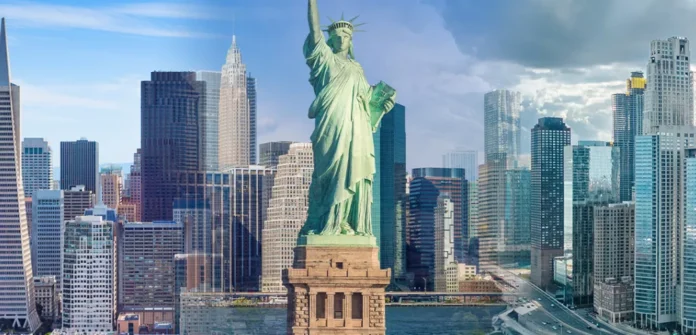Most nations are shaped by tribe or throne. From its founding, America pioneered a different path: the first nation built on a proposition—that free people, left to pursue their ambitions, could forge a lasting society. Not inherited wealth or ancient titles but frontier grit, individualism, and the belief that dignity springs from initiative built this country. Over 249 years, this blend has made the US not just an anomaly but an economic superpower.
Today, the US economy accounts for nearly a quarter of global GDP, despite hosting just 5% of the world’s population. Its GDP per capita ($83,000) is double the EU’s ($41,000) and far exceeds Russia’s ($15,000)—a testament to its productivity, innovation, and dynamism. As the Institute of Economic Affairs noted, even Mississippi, the poorest US state, now boasts a per-capita GDP higher than Britain’s and on track to outpace Germany’s growth this year.
Three forces have driven America’s rise:
- Immigration: The Engine of Enterprise
Economist Thomas Sowell long argued that environment, not origin, determines success. Nowhere is this truer than in America’s immigration story. Immigrants make up 14% of the population but 27% of all entrepreneurs; over 44% of Fortune 500 firms trace their roots to immigrants.
Critics fret about crime or assimilation, but data contradicts them: illegal immigrants have a homicide conviction rate 26% lower than native-born Americans, while legal immigrants have a rate 61% lower. Half of immigrants aged five and older speak English proficiently, with 37% fluent and 17% speaking only English at home.
This isn’t magic—it’s system design. In America, immigrants find legal stability, economic flexibility, and a culture that rewards striving. As Sowell noted, poverty-stricken arrivals often thrive, enriching both themselves and their new home.
2. Innovation: From Dreams to Dominance
Immigrants in America don’t just work—they invent. Austrian economist Israel Kirzner saw entrepreneurship as “alertness” to hidden opportunities. America’s tolerance of risk and view of failure as a learning curve has nurtured this alertness. Consider Elon Musk, who left South Africa to revolutionise electric cars (Tesla) and spaceflight (SpaceX); Jensen Huang, a Taiwanese immigrant who founded NVIDIA, now central to AI; or Sundar Pichai, an Indian native leading Alphabet (Google’s parent).
Innovation isn’t confined to Silicon Valley. ExxonMobil pushes carbon capture, John Deere leads in AI farming, and Starbucks’ Howard Schultz rose from poverty to champion the “American dream.” As Kirzner theorised, open societies where risk pays off breed entrepreneurial breakthroughs. With 28 million small and medium enterprises generating 60% of new private-sector jobs, America’s innovative spirit remains undimmed.
3. Institutions: The Framework for Freedom
None of this would matter without robust institutions. Nobel laureate Daron Acemoglu shows that prosperity stems from “inclusive institutions” that protect property rights, enforce contracts, and enable participation. The Declaration of Independence enshrined this: “all men are created equal” with rights to “Life, Liberty and the pursuit of Happiness.” By limiting government power, separating authorities, and grounding law in common sense, America’s founders built a framework where individuals could thrive without fearing expropriation.
This system—rooted in common law, decentralised governance, and checks and balances—contrasted sharply with the despotisms of its era. The result? The world’s most billionaires, a magnet for talent, and an economy that turns “rags to riches” from cliché to reality.
The Merchant Republic’s Mantra
Australian scholar Sam Gregg calls America a “merchant republic”—a society defined not by aristocracy but enterprise. Its greatness didn’t come from protectionism or bureaucracy, but from the courage to welcome strivers, tolerate failure, and protect the right to build. At 249, the lesson remains: America thrives not by closing doors but by opening them to those who dare to dream, try, and try again.

